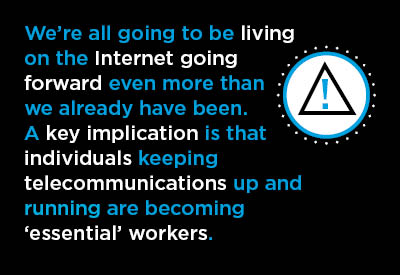With the world-wide spread of the new coronavirus, present days are delivering incredible uncertainty for everybody. Just the same, there are some ‘tectonic’ shifts underway that one can speak of with a fair degree of certainty, although some of the points listed below may not transpire exactly as set out.

Furthermore, there are going to be consequences that will seemingly appear out of nowhere, but which will later be viewed as embarrassingly obvious, leading to the question, “How could I have missed that?”
Also, keep in mind that I’m coming at this subject matter from an impact-on-construction point of view.
- We’re all going to be living on the Internet going forward even more than we already have been. A key implication is that individuals keeping telecommunications up and running are becoming ‘essential’ workers.
- In periods of past crises, it was ‘first responders’ who were the heroes. In the present coronavirus crisis, extra responsibility is being placed on ‘front-line workers’ ‒ i.e., those being required to risk illness while working with the general public in health care, policing and firefighting. More broadly, ‘front-line workers’ will also encompass grocery store and pharmacy staff, bank tellers and mechanics keeping machinery operating and vehicles on the road.
- Remember how everyone was complaining a short time ago that while the economy was expanding rapidly, wage increases weren’t keeping up. Well, it seems most likely that the compensation gains of the past will soon look pretty good. Most companies, struggling to survive, wont’ be in a hurry to put through pay hikes over the next six months to a year. ‘Essential’ workers may feel they have the leverage to ask for more, but I suspect those requests will be suppressed by government mandate.
- A great many of us are being set up to work from home. Over the past several years, new private office building work has been a mainstay of nonresidential construction. There’s going to be a wholesale re-assessment of whether the new office-space square footage will be necessary. Additionally, the longer the crisis lasts, the more entrenched the notion of working outside a ‘formal setting’ will become.
- Reduced commuter traffic will have a host of negative connotations for other kinds of construction activity, such as rapid transit projects and ‘bullet’ trains. Investment spending on cruise ship terminals any time soon seems unlikely. Even the previously announced massive capital spending planned for airports may well be in jeopardy.
- The forced lifestyle changes sweeping over all of us and which necessitate more online shopping for even everyday items, such as groceries, will eventually give a boost to the building of more ultra-large warehouse and fulfilment centers. Amazon has announced a hiring blitz and, in contradiction to the first bullet point above, is promising pay raises to keep staff contented.
- Over the past decade, a proliferation of courses offered online by academic institutions has reduced the need for students of all ages to be physically present in a classroom. Thank goodness, because it has meant schools can be closed during the COVID-19 outbreak, to limit spread of the disease. The acceptance of ‘digital’ learning will accelerate beyond the present storm.
- How will homebuilding fare while potential house hunters stay sequestered? It’s a safe bet that in-person visits to resale and model homes will diminish. There may, however, be an uptick in virtual viewings of residential properties, new and existing, by means of e-commerce real estate portals.
- The new hordes of stay-at-homes may soon grow bored and decide to finally undertake those do-it-yourself renovation projects that have been staples of their dreams for years. Working to mitigate such aspirations, though, are worries over the certainty of ongoing pay checks and possible reluctance to frequent building material stores (that is, if they stay open).
- The rampant trend towards the globalization of supply chains, which may save on costs but have clearly been revealed to carry severe unexpected risks, is sure to come under review by many major corporations. As world trade takes a hit, port expansions will be shelved for a while.
- In the 2008-2009 recession, there was extreme shrinkage in the banking community. Subsequently, regulators on every continent insisted on banks shoring up their capitalization. Therefore, there is good news in the fact that financial services companies are in better shape entering these hard times than they were heading into the previous stressful occasion.
- During the onset of the coronavirus crisis, with the demand for fossil fuels falling, the global price of oil has plummeted. Last year’s construction starts were replete with mega-sized energy projects, including ethane crackers, refineries and LNG terminals. It’s hard to make a case that there will be many (any?) mega energy project authorizations this year. On the plus side, though, with respect to all manner of resources, it’s a lucky circumstance that both the U.S. and Canada have fair degrees of self-reliance.
- On the other side of this chasm, when coronavirus fears begin to wane, there’s going to be a considerable backlog of delayed economic and other activity that will need attention. Foremost with respect to ‘other activity’ will be efforts to catch up on postponed elective surgery. Appointments for dental work and eye care will also surge.
- A year ago, there was a lot of griping out of Europe over a phenomenon being spoken of as ‘overtourism’. There were complaints of too many people crowding too many popular destination sites. Not to make light of the matter, but overtourism’s not such a big problem anymore.
Also, read “Coronavirus-Plus: Other Calamities won’t be Taking a Holiday“.
Alex Carrick is Chief Economist for ConstructConnect. He has delivered presentations throughout North America on the U.S., Canadian and world construction outlooks. Mr. Carrick has been with the company since 1985. Links to his numerous articles are featured on Twitter @ConstructConnx, which has 50,000 followers.











Recent Comments
comments for this post are closed